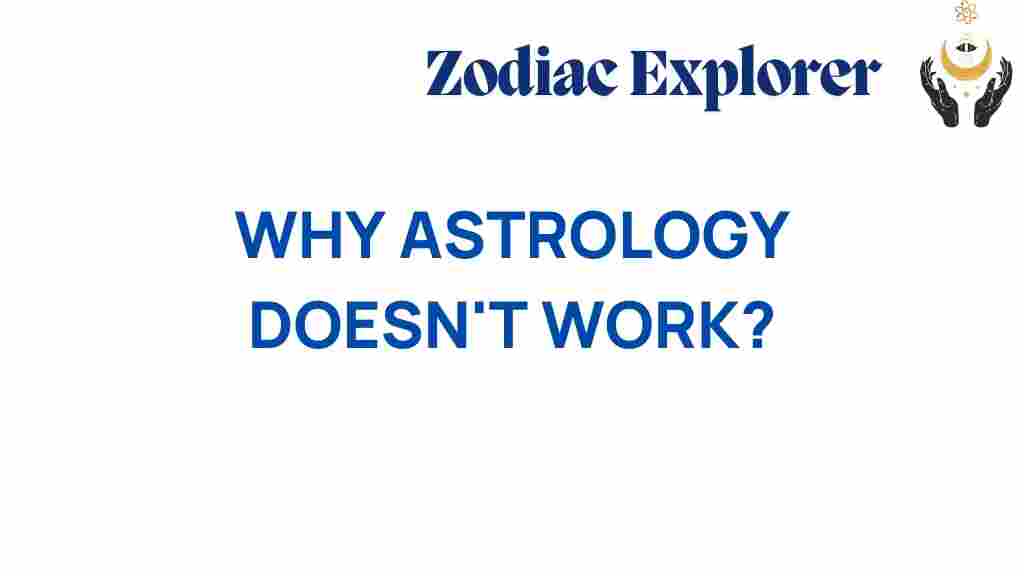The Unraveling Mystery: Why Astrology Doesn’t Work for Everyone
Astrology has fascinated individuals for centuries, promising insights into our personalities, relationships, and even our futures. Yet, despite its popularity, many people find that astrology does not resonate with them. This article delves into the reasons behind the skepticism towards astrology, exploring how beliefs, science, and psychology play a pivotal role in shaping our interpretations of horoscopes and our views on cosmic influence.
Understanding Astrology and Its Appeal
Astrology is the study of the movements and relative positions of celestial bodies, interpreted as influencing human affairs and the natural world. Many individuals turn to astrology for guidance, hoping that the stars can shed light on their fate and provide predictions that may help them navigate life’s challenges.
Some reasons people are drawn to astrology include:
- Curiosity: The desire to understand oneself and one’s place in the universe.
- Comfort: Seeking reassurance during uncertain times.
- Community: Connecting with others who share similar beliefs.
- Guidance: Looking for advice on personal and professional decisions.
The Role of Skepticism in Astrology
Despite the allure of astrology, skepticism remains a prominent viewpoint among many individuals. This skepticism can stem from various sources:
- Scientific Evidence: The scientific community often dismisses astrology as a pseudoscience due to a lack of empirical evidence supporting its claims.
- Psychological Factors: Cognitive biases, such as the Forer effect, lead individuals to perceive vague descriptions as personally meaningful.
- Personal Experience: Many people have had experiences where astrological predictions missed the mark entirely.
Why Astrology Doesn’t Work for Everyone
The effectiveness of astrology varies widely among individuals. Here are some key reasons why astrology may not resonate with everyone:
1. Individual Beliefs and Mindset
Your belief system plays a significant role in how you interpret astrological predictions. For instance, someone with a strong belief in science may approach horoscopes with skepticism, questioning their validity. On the other hand, someone who is open to mystical beliefs may find astrology more applicable to their lives.
2. Psychological Interpretation
Psychology significantly impacts how individuals receive and interpret astrological information. Factors such as:
- Confirmation Bias: Individuals may only notice instances where astrology appears to be correct, reinforcing their belief in it.
- Expectations: If someone expects astrology to provide specific insights, they may overlook vague or inaccurate predictions.
Consequently, a person’s psychological state can shape their experience with astrology, leading to different interpretations of the same horoscopes.
3. Cultural Context
Astrology is often deeply embedded in cultural beliefs and practices. In cultures where astrology is widely accepted and practiced, individuals may find it more relatable and accurate. Conversely, in cultures that prioritize scientific reasoning, astrology may be viewed with skepticism.
4. The Nature of Predictions
Astrology relies on interpretations that can be subjective. Predictions and interpretations can vary based on the astrologer’s insight and the individual’s context. This variability can lead to inconsistent experiences among those seeking guidance from horoscopes.
How to Approach Astrology if You’re Skeptical
If you are skeptical about astrology but still curious, consider the following steps:
- Research: Read both supportive and critical literature on astrology to understand its principles and critiques.
- Keep an Open Mind: Approach horoscopes and predictions with a balanced perspective. Consider them as a tool for reflection rather than absolute truth.
- Personal Experience: Experiment with your own horoscopes. Note what resonates with you and what doesn’t.
Troubleshooting Your Astrology Experience
If astrology hasn’t worked for you, here are some troubleshooting tips to enhance your experience:
1. Find the Right Astrologer
Not all astrologers are created equal. Look for someone whose style and approach resonate with you. A skilled astrologer can provide more personalized insights that may align better with your experiences.
2. Focus on Personal Reflection
Instead of taking predictions at face value, use astrology as a springboard for self-reflection. Consider how the insights may relate to your life, regardless of whether you believe in cosmic influence.
3. Join Discussion Groups
Engaging with others interested in astrology can provide different perspectives. Whether online or in person, sharing experiences can lead to deeper understanding and appreciation.
4. Compare with Other Disciplines
Explore how astrology aligns or contrasts with other belief systems or psychological insights. This comparison can enhance your understanding of its potential value.
Conclusion: The Cosmic Influence of Beliefs
Astrology remains a topic of fascination, straddling the line between belief and skepticism. While it offers insights for some, others find it lacking in personal relevance. Understanding the factors that influence our experiences with astrology can help us navigate its complexities.
Whether you are a staunch believer or a skeptic, astrology can serve as a tool for reflection and personal growth. Ultimately, the interpretation of horoscopes and cosmic influence is deeply personal, shaped by our beliefs, psychological predispositions, and cultural contexts.
For more insights on astrology and its implications, check out this resource.
If you want to explore the intersection of science and astrology further, visit this external link.
This article is in the category Myths and created by ZodiacExplorer Team
